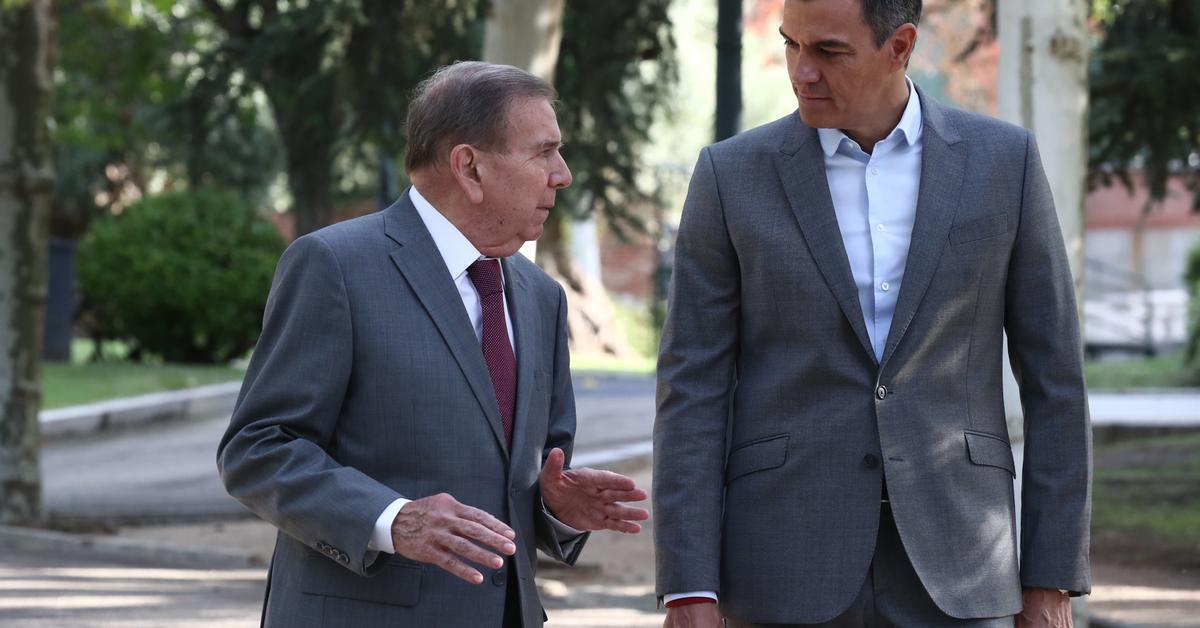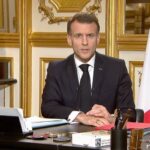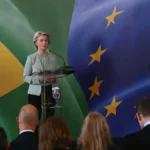
Sunday, September 8th at 5.16 in the morning. The Spanish Foreign Minister, José Manuel Albares, publishes a post on X with an announcement: “Edmundo González, at his own request, is flying to Spain on a Spanish Air Force plane. The Government of Spain is committed to the political rights and physical integrity of all Venezuelans.”
Six days later, the Venezuelan government announced, on Saturday, the arrest of two Spanish citizens, who it links to the CNI and who it claims are allegedly involved in a plan to carry out “terrorist” acts against Nicolás Maduro. The arrest was announced by the Minister of the Interior and Peace, Diosdado Cabello, during a press conference. The Spanish government has assured that the detainees are not CNI agents and has reported that the Spanish Embassy has sent a verbal note to the Venezuelan government requesting access to the detainees, in order to verify their identities and nationality and to find out exactly what they are accused of.
Minister Albares’ message came hours after the President of the Government, Pedro Sánchez, called Edmundo González a “hero.” The departure from Venezuela of the opposition leader, who since July 29 had been in Dutch diplomatic offices in Caracas, took place after eight intense days of talks between the different parties – González and his closest entourage, and the Spanish and Venezuelan governments – to obtain the approval of Nicolás Maduro’s Government for González to board a Spanish Armed Forces plane to fly to Madrid, by virtue of the asylum granted by Pedro Sánchez’s Government.
The lace-making, in which former President José Luis Rodríguez Zapatero played a key role, seemed to satisfy the parties involved on that Sunday, September 8: the Venezuelan government got rid of González Urrutia and left the opposition in disarray; González Urrutia showed his gratitude to the Spanish government for the welcome and Spain proved to be a “friendly” country for the Venezuelan opposition that, at the same time, was capable of agreeing on such a delicate operation with the Maduro administration.
But that calm would turn into a growing storm whose outcome is yet to come.
On Sunday, the PP was already accusing the Government of being “an accomplice of the Bolivarian dictatorship” for bringing a person who had requested asylum to Spain, and this despite the fact that some of its leaders, such as Isabel Díaz Ayuso, had previously accused the Government of collaborating with Maduro for not granting asylum to González Urrutia.
The PP then decided to point out that the real leader of the Venezuelan opposition was María Corina Machado, who “is not for sale”, to the detriment of González Urrutia, although it registered a PNL in Congress to recognise the latter as “president-elect” and, in the process, put pressure on the Government and give it a parliamentary defeat, as well as trying to wear down the PSOE-Sumar coalition and the relations between the Executive and the rest of its left-wing parliamentary allies –Podemos, EH Bildu, ERC, BNG–.
In just 72 hours, in which the Popular Party has played a leading role, the cordial understanding between Madrid and Caracas, which was already tense due to Spain’s non-recognition of Nicolás Maduro’s victory on July 28, erupted into a diplomatic conflict.
On Tuesday morning, the PNV spokesman, Aitor Esteban, announced his group’s positive vote on the PP’s proposal to recognise González Urrutia, which has political value although it is not binding. With that Yeah from the Basque nationalists, the PP was already doing the math: the Spanish Congress of Deputies was preparing to align itself with Javier Milei’s own positions – beyond those defended by the EU and the US – and on Wednesday approved a non-binding motion from the Popular Party, which left the Government in a minority, and in which the Government of Spain was urged to recognise González Urrutia as “president-elect”.
Escalation of the crisis
Hours after the vote, the president of the Venezuelan National Assembly, Jorge Rodríguez, asked the Foreign Affairs Committee of the Legislative Chamber to approve a resolution urging the Government of Nicolás Maduro to “break” all types of relations with Spain.
Twenty-four hours after that, on Thursday night, the crisis escalated even further: Venezuela recalled its ambassador in Madrid for consultations while describing as “interventionist” statements by the Spanish Minister of Defense, Margarita Robles, in which she described Venezuela as a “dictatorship.”
On Thursday, in addition to Robles’ statements, in the morning Moncloa released some images of González Urrutia’s visit, where he was received by the President of the Government, Pedro Sánchez, recently arrived from China, where he asked not to tighten the European tariff policy on Chinese electric cars.
In a context in which the spiral is growing with each passing day, the coming week does not seem to promise a de-escalation.
Feijóo’s PP has proposed to be the champion of the Venezuelan opposition in Europe, as has been the case in the past, to the point of having made Leopoldo López, Sr., a member of the European Parliament. The party wants to lead the toughest positions against Maduro in Brussels and, in that line, a resolution similar to the PNL approved on Wednesday in Congress and which will be voted on next Tuesday in the Senate will be approved in the European Parliament this week. The request is the same, that is, the recognition of Gutiérrez Urrutia as the “elected and legitimate president” of Venezuela.
Tensions are growing between Venezuela and Spain, and the right is exploiting the crisis against the government.
Source: www.eldiario.es

